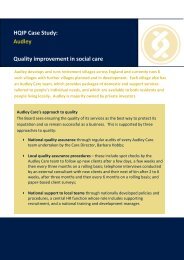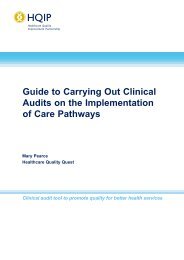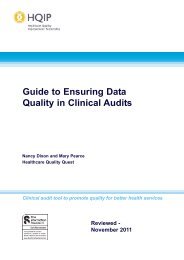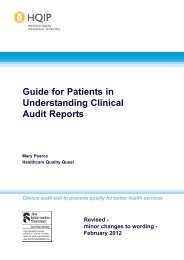Good Governance Handbook - HQIP
Good Governance Handbook - HQIP
Good Governance Handbook - HQIP
Create successful ePaper yourself
Turn your PDF publications into a flip-book with our unique Google optimized e-Paper software.
5. Types of <strong>Governance</strong><br />
5.1 Mechanics of <strong>Governance</strong><br />
The general approach for unitary boards is to adopt the UK Corporate <strong>Governance</strong><br />
code (previously known as the Combined Code) 15 on the basis of the Cadbury,<br />
Greenbury and Higgs reports. 16,17,18<br />
The main principle of the code is that every institution should be headed by an<br />
effective board, which is collectively responsible for the success of the organisation.<br />
The board’s role is to provide leadership of the organisation within a framework of<br />
prudent and effective controls which enables risk to be assessed and managed.<br />
The board should operate in the round focusing on the business of the organisation<br />
by:<br />
• constructive challenge and shaping proposals on strategy<br />
• scrutinising the performance of management in meeting agreed goals and<br />
objectives<br />
• monitoring the reporting of performance<br />
• satisfying themselves that services are safe and cost effective; on the integrity<br />
of financial information and that controls and systems of risk management are<br />
robust and defensible.<br />
There should be just one governance; the use of qualifying adjectives is unhelpful and<br />
perpetuates or encourages silos of governance however it is important for boards to<br />
understand what is meant by regulators and others introducing terms such as Quality,<br />
Clinical, Information and Research <strong>Governance</strong> especially where compliance is<br />
expected or required. It is for the board to seek to align and integrate these<br />
components and demonstrate grip over them all.<br />
5.2 Quality and Clinical <strong>Governance</strong><br />
Everyone who uses the NHS expects to receive care of the highest standard. “Quality<br />
<strong>Governance</strong>: The duty of each NHS body to put and keep in place arrangements for<br />
the purpose of monitoring and improving the quality of health care provided by and<br />
for that body” is a legal requirement. 19<br />
From 1997 and in part in response to the Bristol Heart Inquiry 20 this ambition has<br />
been supported by the concept of Clinical <strong>Governance</strong>:<br />
15 Financial Reporting Council, The UK Corporate <strong>Governance</strong> Code, June 2010<br />
16 Cadbury report, Financial Aspects of Corporate <strong>Governance</strong>, 1992<br />
17 Greenbury report, Directors’ Remuneration, 1995<br />
18 Higgs Report, Review of the role and effectiveness of non-executive directors, 2003<br />
19 Health and Social Care (Community Health and Standards) Act 2003<br />
20 The Bristol Royal Infirmary Inquiry, July 2001<br />
www.good-governance.org.uk 18

















